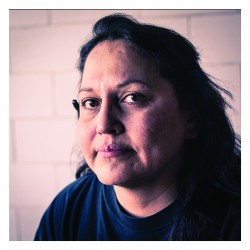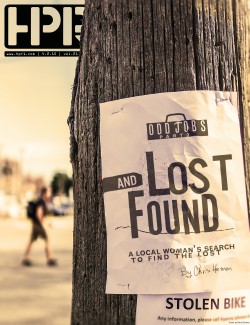Culture | April 1st, 2015

A Fargo woman spends her free time helping search for missing persons in western North Dakota. Lissa Yellowbird-Chase takes weekends to travel across the state at her own expense, usually at families’ requests, to learn more about those who’ve gone missing in unsolved cases.
Yellowbird-Chase works as a welder at TrueNorth Steel, but she used to be a tribal attorney on her native Fort Berthold Indian Reservation. Through Facebook, she was asked by friends and family members to help locate Kristopher Clarke, a 29-year-old man who came to work in the Bakken in Mandaree, N.D. and went missing in 2012. Clarke’s mom started a Facebook page, which Yellowbird-Chase initially ignored until one of her friends insisted she read up on it. Because Clarke went missing on reservation land and was not a member of the tribe, she knew there were many jurisdictional issues that would cause searches for Clarke to not be extensive.
“I can see why nobody’s looking for this kid, basically. Because of all the jurisdictional issues there, this kid is falling through the cracks. So she said, ‘I need you to commit to this.’ So that’s what started it, right there,” Yellowbird-Chase told HPR.
Because of her work on that one case, other family members of missing persons started contacting Yellowbird-Chase via Facebook asking for her help to find their loved ones in North Dakota. She started to realize the numbers of missing were greater than she anticipated.
“Most of the families are people from out of state, people that are not having an oil boom, people that are having some serious economic hardships outside of oil-rich areas,” she said. “How could anybody say no to them? So I’ve been just trying to do what I can to help these families, to give them some hope and exposure and some answers.”
As to why western North Dakota has so many unsolved missing person cases, and in turn why she is spending so much time out there, Yellowbird-Chase believes it’s easy to explain.
“There was a mad rush of money and everybody was trying to get things going and basically people were hiring out there. If you had air moving through your lungs and a pulse, they were hiring. So people were coming from all over the place,” Yellowbird-Chase said.
“It was kind of a free-for-all there. So in comes … a wide span of different kinds of people: you’ve got different cultures, you’ve got predators coming through, you’ve got people that want to stay under the radar coming through. Human trafficking, people in the sex industry -- everyone who wants to make a dollar -- they are showing up there. And you have the drug trafficking, and with that comes the trouble.”
Law enforcement, for the most part, welcomes her assistance in searches. She calls ahead to county sheriffs when visiting, and occasionally officers will join her and offer help. Most of the time they search on tribal land or private property anyway, and she says with the increase in crime out west, law enforcement doesn’t always have the necessary time or resources to devote to missing persons cases.
“You’ve got to realize out there, they have a lot of work,” Yellowbird-Chase said. “They have this influx of people. I hate to say it, but they really don’t have the time to do this type of stuff.
She says the best part of the work she does is assisting the families from out of state.

“Being able to give the families hope, being able to give other families closure, that’s the ultimate ideal for everyone. Ultimately I would like to have no missing persons in our state; I’d like to have everyone accounted for,” she said.
The worst part for her is when they feel the search is on the verge of finding someone and it comes up empty. One such occasion happened last year, when they brought in a dive team from out of state to search for Clarke in Lake Sakakawea and nothing turned up.
“We scoured half that lake and came up empty handed. That was a long ride home. I’ll never forget that day. I just about cried the whole way home,” Yellowbird-Chase said. “It’s a double-edged sword. You want closure. You almost want it just as much as the family, if not more. But then again, you do maintain that little ray of hope that maybe that person is out there, alive and well.”
Her employer TrueNorth Steel has been great about giving her time off when searches warrant and gave her kudos for what she has done when people started taking notice. She is also the mother of five children, three of whom are grown, two of whom have helped her from the beginning with the searches.
Because of the recent attention her searches have received, Yellowbird-Chase will get some more help, and not just from her family. She has an intern who will be helping organize summer searches, and she will meet with six other people next week to help plan searches. This summer they are planning to actively search for five missing persons in North Dakota.
“We’re starting to get people that have stepped forward and want to be part of what we do. We’re starting to get some help, which is nice because it’s been a lot of work,” Yellowbird-Chase said.
One issue that concerns Yellowbird-Chase is how most of the reported missing persons in the state are men. She feels that means there are more missing people in North Dakota than are reported.
“The women are either not being accounted for, [or else] where are they? Statistically -- I don’t have any exact figures for you -- we’re not matching up with what the normal figures are. So either we’re above the norm, which is kind of unusual for the circumstances with what’s going on in our state, or there’s women that are missing and murdered, and we’re totally unaware that anything has happened,” Yellowbird-Chase said. “Somebody needs to start keeping track of what’s going on, especially in the human trafficking industry.”
You can keep updated on Yellowbird-Chase’s efforts on the Facebook group page, Missing Persons of North Dakota, where anyone can post about missing persons in the state. She also has a page, Sahnish Scouts of North Dakota, where she will update progress during the summer searches.
She welcomes any help, even if it just means bringing food and water to searchers out on the job, such as elderly women from Williston did. She doesn’t hope, however, to be reimbursed for her efforts or become a tax-exempt entity.
“I give and I don’t need to be tax exempt,” Yellowbird-Chase said. “Just give because you want to, because it’s a good thing.”
February 16th 2026
February 13th 2026
January 15th 2026
January 15th 2026
December 18th 2025
_(1)_(1)_(1)_(1)_(1)__293px-wide.jpg)



__293px-wide.png)
__293px-wide.jpg)